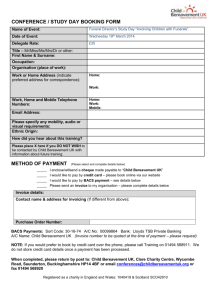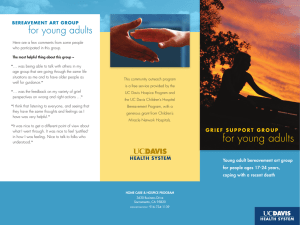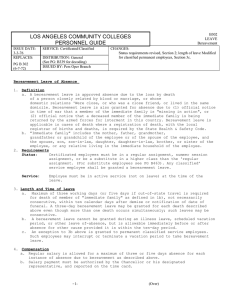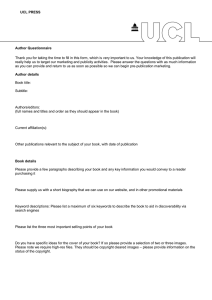Participant information sheet for UCL Bereavement Study internet questionnaire
advertisement
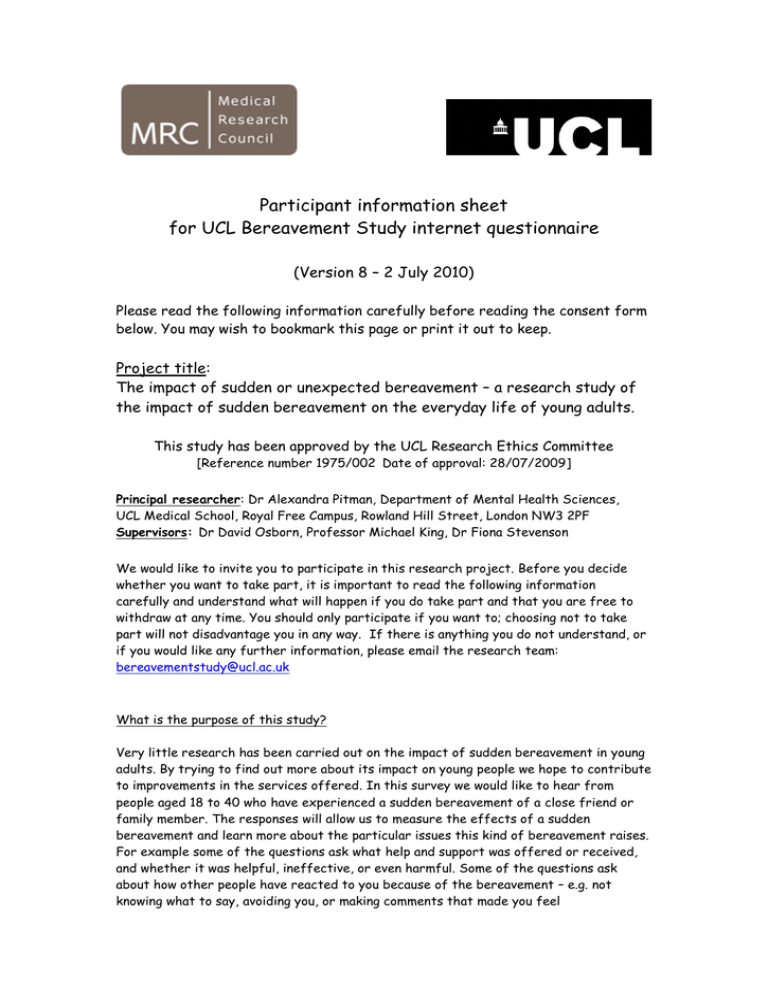
Participant information sheet for UCL Bereavement Study internet questionnaire (Version 8 – 2 July 2010) Please read the following information carefully before reading the consent form below. You may wish to bookmark this page or print it out to keep. Project title: The impact of sudden or unexpected bereavement – a research study of the impact of sudden bereavement on the everyday life of young adults. This study has been approved by the UCL Research Ethics Committee [Reference number 1975/002 Date of approval: 28/07/2009] Principal researcher: Dr Alexandra Pitman, Department of Mental Health Sciences, UCL Medical School, Royal Free Campus, Rowland Hill Street, London NW3 2PF Supervisors: Dr David Osborn, Professor Michael King, Dr Fiona Stevenson We would like to invite you to participate in this research project. Before you decide whether you want to take part, it is important to read the following information carefully and understand what will happen if you do take part and that you are free to withdraw at any time. You should only participate if you want to; choosing not to take part will not disadvantage you in any way. If there is anything you do not understand, or if you would like any further information, please email the research team: bereavementstudy@ucl.ac.uk What is the purpose of this study? Very little research has been carried out on the impact of sudden bereavement in young adults. By trying to find out more about its impact on young people we hope to contribute to improvements in the services offered. In this survey we would like to hear from people aged 18 to 40 who have experienced a sudden bereavement of a close friend or family member. The responses will allow us to measure the effects of a sudden bereavement and learn more about the particular issues this kind of bereavement raises. For example some of the questions ask what help and support was offered or received, and whether it was helpful, ineffective, or even harmful. Some of the questions ask about how other people have reacted to you because of the bereavement – e.g. not knowing what to say, avoiding you, or making comments that made you feel uncomfortable. Through piloting the questionnaire we have tried to address all those areas suggested as relevant by bereaved people, as well as those areas highlighted by previous research. If you do not wish to answer any of the questions please skip it and move to the next one. Once the research has been analysed we will communicate our findings to NHS and voluntary sector organisations that provide bereavement services, and also use the results to guide future research. Why have I been invited? We have been given permission by a range of UK universities and colleges to email all their students and staff in order to reach bereaved adults aged 18 to 40. The universities have agreed to help us because they feel this is an important research area. They are also keen to learn from the overall findings of the study, to find out how their employee and student support services can best meet people’s needs. The survey has already been piloted on bereaved people who are in touch with voluntary organisations like Cruse Bereavement Care, Samaritans, Survivors of Bereavement by Suicide, and Widowed by Suicide. These organisations are also interested in using the overall results to help them respond to young people more appropriately. However only the research team will have access to the data, and we will only know who participates if the respondent chooses to include their name. All the data we collect will be made anonymous. This means that when we analyse it no individual who participates will be recognisable. What are the participation criteria? 1) Participating university or college: Participating UK universities and colleges are sending an email invitation to their staff and students containing links to the online questionnaire. 2) Age range: Within each participating university or college we are inviting participation from people aged 18 to 40 who have experienced any sudden bereavement since the age of 10. This is because children tend to react to bereavement in different ways to adolescents or adults, and because there may be difficulties remembering events that took place in childhood. The age group chosen does not imply that that bereavement has a lesser impact in other agegroups, but allows us to focus on a specific sub-group which has tended to be under-represented in work of this kind. 3) Sudden bereavement: By sudden bereavement we mean a death that could not have been predicted and which occurred suddenly or within a matter of days. This may have been due to natural causes (for example an epileptic seizure, cardiac arrest, or a stroke), or unnatural causes (for example a road crash, homicide, or suicide). This could also apply to someone who was diagnosed with a serious illness, but who had died earlier than had been expected. We are essentially taking the perspective of the person who was bereaved – ie if you felt it was an unexpected bereavement then it was. Again, by focussing on sudden bereavements we are not implying that sudden bereavement has a greater impact, but are investigating a specific group on which there is less research. Who is on the research team organising the study? We are a research team from the Department of Mental Health Sciences at UCL (University College London), based on sites in Bloomsbury and at the Royal Free Hospital in North Camden. Dr Alexandra Pitman, Dr David Osborn and Professor Michael King are all research psychiatrists, and Dr Pitman is carrying out this research as part of her PhD thesis. Dr Fiona Stevenson is a medical sociologist in the UCL Department of Primary Care and Population Health. What do I do if I decide to take part? Taking part involves filling in an on-line questionnaire, which has 2 parts. Part 1 contains tick-box questions and should take about 5-10 minutes. Part 2 contains free text boxes for you to provide as much or as little detail as you wish, and usually takes between 5 and 15 minutes. You can complete the questionnaire wherever you have internet access. Given the theme of bereavement you may choose to do this in private or where you will not be disturbed. At the end of the questionnaire you will be asked whether you wish to volunteer for a face-to-face interview at UCL or locally. You are free to decide if you would like to do this or not, and you can also withdraw this decision subsequently. Further information is available before you make this decision: see the link Information sheet for interviews on the study website. What are the possible benefits of taking part? Taking part provides researchers and healthcare professionals with very important information about the views and needs of bereaved people. This helps plan the services provided. We hope that you may find it helpful to think about the questions we ask, and to give your views in an anonymous forum. What are the possible risks of taking part? Some people find that thinking about their situation makes them upset or sad. If you feel unhappy about any part of the questionnaire you can choose to move on immediately to the next question. You also have the option to stop altogether, or to save your responses and return at a later time. Throughout the questionnaire a weblink will be visible at the foot of the screen to link you to a list of bereavement support services. Can I withdraw at any time? Yes. You do not have to take part in this study if you don’t want to. If you decide to take part you are still free to withdraw at any time and without giving a reason. As participation is anonymous we will not be aware of who has taken part unless they specifically give their name. Similarly your university will not be aware of whether you have participated or not. Please note that the programme saves data on every page so it will not be possible for us to withdraw your data once you have gone beyond the first page. What happens when the study ends? The results will be analysed and compiled into a report. This report and the key findings will be available via the UCL Bereavement Study website. No individual respondent will be identifiable from this information. Copies of the report will be available on request. The results will be fed back to all those providing bereavement support services in the UK. These will include general practitioners, other NHS services, voluntary organisations (eg. Cruse Bereavement Care, Samaritans, Widowed by Suicide, Survivors of Bereavement by Suicide), university support services, the Department of Health, and the general public. Future work We also hope to conduct a follow-up study in a few years time to explore whether there are any changes in how people adjust to a sudden bereavement over time. Anyone who takes part in the internet questionnaire will be asked whether they would be happy to be contacted about participation in a future follow-up study. This is entirely optional, and if you do provide a contact address or number but later decide not to participate, you are free to withdraw at any time. You do not have to give any reason for withdrawing and your university will not be aware of your participation or non-participation. Confidentiality All data will be collected and stored in accordance with the Data Protection Act 1998. This means that all of the personal information that you give for this survey will be treated as confidential. It will only be used for the purposes of the survey and will not be transferred to an organisation outside of UCL. It will not be added to your staff or student records at your university or college. The data will be transferred to the Department conducting the survey who will retain it in compliance with the UCL Records Retention Schedule. The data will also be stored by UCL Information Services for six months and will then be removed from the Opinio system. We will make sure that information is stored securely and in an anonymous form. This means that your information will not be stored in a way that means it can be linked directly to you. Giving informed consent to take part We would now like you to think about whether you would like to take part in this study. If so please read the statements on the consent form below. Thank you very much. Dr Alexandra Pitman Research Fellow UCL Medical School Informed Consent Form for internet-based questionnaire participants Private and Confidential Please read the above Participant Information Sheet carefully before reading this consent form Thank you for your interest in taking part in this research. Before you agree to take part you must be clear about what the project involves. Please email the research team if you have any questions before participating in the survey. You are being to asked to give your consent to complete an internet questionnaire about sudden bereavement Please read the points below to check that you agree with them before proceeding to the survey. I have read the notes written above in the Participant Information Sheet, and understand what the study involves. I understand that if I decide at any point in the questionnaire that I no longer wish to take part I can stop immediately. I do not need to notify the researchers involved, and the university will not be aware of whether I have participated in this study or not. I understand that if I choose to give my name or contact details within my responses or for participation in any further studies these will only be available to the research team. If I subsequently decide to withdraw from any further studies I may do so. The university will not be aware of whether I offered to participate or not, or indeed whether I have withdrawn participation or not. I understand that the information I give will be treated as strictly confidential and handled in accordance with the provisions of the Data Protection Act 1998. I understand that the information I have submitted will be published as a report and I can be sent a copy on request. Confidentiality and anonymity will be maintained and it will not be possible to identify me from any publications. I agree that my non-personal research data may be used by others for future research. I am assured that the confidentiality of my personal data will be upheld through the removal of any identifiers. If you agree with all of the above please open the email you received about the UCL Bereavement Study. There you will find the link to the questionnaire (powered by Opinio software). Clicking on this link will open up the front page of the questionnaire, and after this first question will check that you agree to take part. If you answer “Yes – I agree” you can then proceed to the subsequent questions. If you have any further queries, or problems accessing the questionnaire, please email: bereavementstudy@ucl.ac.uk Thank you for your time. We very much appreciate your help. Dr Alexandra Pitman Research Fellow UCL Medical School
